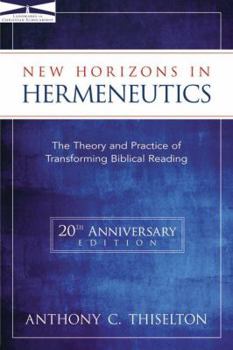New Horizons in Hermeneutics: The Theory and Practice of Transforming Biblical Reading
Select Format
Select Condition 
Book Overview
Dr. Anthony Thiselton's thorough approach to the growing discipline of hermeneutics takes account of a comprehensive range of theoretical models of reading and interpretation. He evaluates both the... This description may be from another edition of this product.
Format:Paperback
Language:English
ISBN:0310217628
ISBN13:9780310217626
Release Date:February 1997
Publisher:Zondervan Academic
Length:728 Pages
Weight:2.15 lbs.
Dimensions:1.9" x 5.9" x 9.0"
Customer Reviews
3 ratings
Another Classic that Builds on The Two Horizons
Published by Thriftbooks.com User , 17 years ago
New Horizons in Hermeneutics critically assesses almost the entire range of hermeneutical schools of its day from a stance that had largely, if not entirely, been formulated in Thiselton's thinking from as early as 1976. Thiselton basically argues that hermeneutical theory needs to be rebuilt programmatically so as to overcome the dichotomies and one-sidednesses inherent in broadly positivist, broadly existentialist, broadly structuralist, broadly post-structuralist, and broadly neo-pragmatic approaches - whether to theory or practice. This rebuilding requires a considerable modification of Gadamer's thought along seven axes. First, dialogue needs to be broadened at the level of pre-understanding such that as many traditions as possible are allowed to contribute positively to the hermeneutical conversation. Notably, Gadamer's tradition requires correction from that of Pannenberg and T.F. Torrance, from that of the later Wittgenstein, from that of Saussure, from those of Schleiermacher, Kierkegaard, Heidegger, and Bultmann, and from that of Austin, Evans, Searle, Recanati, and others. This is not at all to say that Gadamer was not well read (!), but rather to say that these traditions should have been allowed to contribute more positively to the critical synthesis within the preunderstanding with which hermeneutical problems and questions are approached. Notably, Gadamer lacks the revealed Christological criterion of the tradition of Pannenberg by which traditions can be interpreted against the broader background of the narrative wholes of eschatological anticipations of history-as-a-whole (metacritical explanation) or by which they can be socio-critically evaluated by a Christological ethics (metacritical evaluation). Second, Heidegger and Gadamer fail to find a philosophy of history that properly accounts for both Dasein's subjectivity (a hermeneutic of selves - not understood transcendentally) and a hermeneutic of traditions without over-emphasising one or other of these two poles in a dichotomous manner that violates the unity of historical reality - a unity that must somehow embrace a process that produces both a posteriori differences and a posteriori continuities whilst also moving towards an eschatological whole. Neo-pragmatic attempts to divorce present reading communities from historical traditions and their operative influence violate the philosophical axiom of the unity of history that resonates with a theology of the unity of creation. Third, Gadamer and Heidegger thereby fail to properly reinstate subject-object conceptualisation - even in its properly historically embedded form premised upon historical continuity and difference - in relation to the critical testing of the transmitted content of traditions against anticipations of trans-temporal, trans-contextual criteria. That is, theology provides solutions to the problem of the metacriticism of traditions and societies left by Heidegger, Gadamer, and even by Habermas and Apel
A monumental work
Published by Thriftbooks.com User , 23 years ago
For advanced students in biblical hermeneutics, this book is indespensible. No more comprehensive analysis of the history and present state of this field is available anywhere. Thiselton traces the more significant developments in hermeneutics in great depth from Schleiermacher up to the present day. In the earlier sections, Thiselton has a tendency ramble. His style becomes significantly more concise, particulalry as he moves toward the contemporary era and the impact of general literary studies on biblical hermeneutics. One of the problems with most discussions of hermeneutics is that they stay almost exclusively on the theoretical level, and rarely venture into application of the methods dsicussed. Thiselton's work is somewhat uneven on this count. The application of some methods is presented and critiqued, while in other areas the biblical text never comes into view. Thankfully, Thiselton does move in determined fashion toward his own hermeneutical perspective, outlines his principles clearly, and offers a preliminary application to some Pauline texts. Biblical studies students will be frustrated that developments in hermeneutics are not more consistently related to the history of biblical exegesis. The hermeneutical assumptions and implications of source and form-criticism, for example, are never discussed directly. These criticisms aside, Thiselton has taken on an immense task and, while his execution is not perfect, there is likely no scholar in the world who could surpass his performance in this vook.
Difficult but excellent discussion of how texts have meaning
Published by Thriftbooks.com User , 25 years ago
This is not a work for beginners. While biblical hermeneutics are in view, it really concerns how we interpret any text. Thiselton has one major concern: are there standards of meaning that go beyond any particular society and embrace all humanity, or not? Thiselton argues throughout the book that there are, while thoroughly and (I think) fairly presenting the alternative viewpoint(s). His major supports include the later Wittgenstein, the speach-act theory of Austin and Searle, and (to a lesser extent) the eschatological vision of Pannenberg. His major targets are the deconstruction of Derrida and Barthes, the pragmatism of Rorty and (some but not all) liberation theologies, and the reader-response theory of Fish. In a typically understated British way, he cheerleads for the one side and pans the other through the whole book. In both modes, however, Thiselton keeps an impressive critical distance (most of the time) in admitting both to the strengths of those he opposes and the weaknesses of those he supports. While difficult, I know of no better one volume treatment of the subject. A thorough and discerning work for the serious student.





